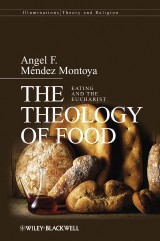Details

The Theology of Food
Eating and the EucharistIlluminations: Theory & Religion 1. Aufl.
|
24,99 € |
|
| Verlag: | Wiley-Blackwell |
| Format: | |
| Veröffentl.: | 12.03.2009 |
| ISBN/EAN: | 9781444308693 |
| Sprache: | englisch |
| Anzahl Seiten: | 192 |
DRM-geschütztes eBook, Sie benötigen z.B. Adobe Digital Editions und eine Adobe ID zum Lesen.
Beschreibungen
The links between religion and food have been known for centuries, and yet we rarely examine or understand the nature of the relationship between food and spirituality, or food and sin. Drawing on literature, politics, and philosophy as well as theology, this book unlocks the role food has played within religious tradition. <ul> <li>A fascinating book tracing the centuries-old links between theology and food, showing religion in a new and intriguing light</li> <li>Draws on examples from different religions: the significance of the apple in the Christian Bible and the eating of bread as the body of Christ; the eating and fasting around Ramadan for Muslims; and how the dietary laws of Judaism are designed to create an awareness of living in the time and space of the Torah</li> <li>Explores ideas from the fields of literature, politics, and philosophy, as well as theology</li> <li>Takes seriously the idea that food matters, and that the many aspects of eating – table fellowship, culinary traditions, the aesthetic, ethical and political dimensions of food – are important and complex, and throw light on both religion and our relationship to food</li> </ul>
Foreword vi<br /> <i>Joaquín Racionero Page</i> <p>Preface ix</p> <p>Acknowledgments x</p> <p>Introduction. Food Talk: Overlapping Matters 1</p> <p>1 The Making of Mexican <i>Molli</i> and Alimentary Theology in the Making 11</p> <p>2 Sabor/Saber: Taste and the Eros of Cognition 45</p> <p>3 Being Nourished: Food Matters 77</p> <p>4 Sharing in the Body of Christ and the Theopolitics of Superabundance 113</p> <p>Conclusion. Food Notes: Prolegomenon to a Eucharistic Discourse 157</p> <p>Index 161</p>
<p>“Nevertheless, this is an inspiring interpretation of the possibility of reclaiming and reconnecting theology, food, and a fuller eucharistic life.” <b>(<i>The Theology of Food</i>, 1 October 2013)</b></p> "This book deserves to be widely read and, if you will forgive the metaphor, digested." <b>(<i>Christian Century</i>)</b> <p>"Montoya's book is a delight to read, and is a significant contribution to the effort to apply theological thinking to the everyday realities of embodied life." <b>(<i>Modern Theology</i>)</b></p> <p>"For all its erudition, this book is more complex and valuable than a simple examination of Christian consumption. It offers rich reflection on the prophetic and generous ways in which Christianity might still disciple consumers who desire the superabundant grace made material in the flesh of Jesus Christ." <b>(<i>Theological Book Review</i>)</b></p> <p>"This much-needed book takes seriously the Churches' unique contribution to understanding the importance of food." <b>(<i>Church Times</i>)</b></p> <p>"A thought provoking and engaging work on the role of the Eucharist in Christian life." <b>(<i>CHOICE</i>)</b><br /> <br /> </p> <p>“[T]his is an inspiring interpretation of the possibility of reclaiming and reconnecting theology, food, and a fuller eucharistic life.” <b>(<i>Interpretation: A Journal of Bible and Theology)</i></b></p>
<b>Angel F. Méndez-Montoya,</b> OP is a member of the Southern Dominican Province in the USA. He currently teaches theology and philosophy at Universidad Iberoamericana, Mexico, where he is also the coordinator of the Faith and Culture Program. He is a Ph.D. in philosophical theology from the University of Virginia and was scholar in residence at University of Cambridge.<br /> <br />
The links between religion and food have been known for centuries. The Bible's story of the origins of humanity begins with the eating of fruit, and at the heart of Christianity – and acted out every Sunday – is the eating of bread which is miraculously transformed into the Body of Christ. For Islam, the eating and fasting around Ramadan are a key part of one of the most important spiritual events of the Muslim calendar, while the dietary laws of Judaism are designed to create awareness of living in the time and space of the Torah. Though we know these things, we rarely examine or fully understand the nature of the relationship between food and spirituality, or food and sin. <p>This book takes seriously the idea that food matters and that eating and many of its aspects – table fellowship, culinary traditions, the relationship between tasting and knowing, and the aesthetic, ethical, and political dimensions of food – are important and complex, and throw light on the relationship between food and religion.</p> <p>Drawing on literature, anthropology, cultural studies, politics, and philosophy as well as theology, this book illuminates the role of food in religion and shows religion in a new and intriguing light.</p>
"This is a book to be savoured like a beautiful meal. Its understanding of the Eucharist springs from both a profound study of the Scriptures and the traditions of the Church, and also a sensuous delight in that most intimate and sustaining of human activities, cooking and eating. This nourishing theological work also challenges us to build a society in which all of humanity shares at the common table of God."<br /> —<b>Timothy Radcliffe</b>, OP, Blackfriars-Oxford University


















